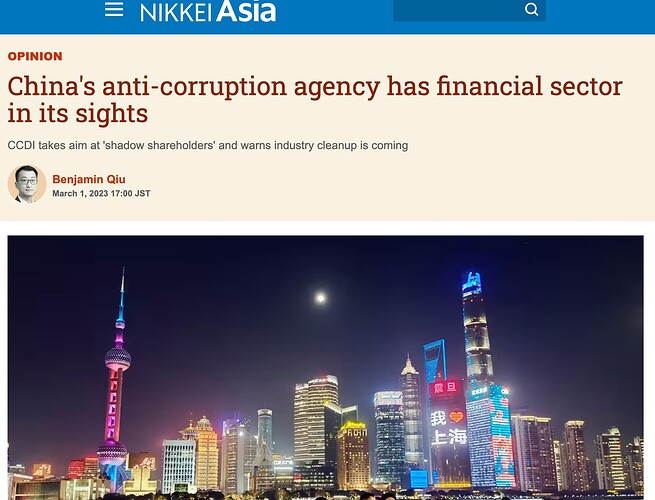-
中国的金融业正面临着十年一次的整顿,在全国人民代表大会召开之前宣布了新的政策和法规。
-
中国共产党的反腐机构–中央纪委发表声明,批评 “金融精英主义”,并呼吁打击裙带关系和 "影子股东 "及 “影子公司”。
-
这里指的是那些以他人名义持有股份或成立公司以掩盖受益人身份的人。
-
这种做法在中国法律下是允许的,但可能违反公司的管理章程或监管披露规则。
-
这种做法被称为 “抽屉里的协议”,在所有经济部门被广泛采用。
-
中国金融业的全面改革可能会产生广泛、复杂和长期的影响。
-
新的法规和政策旨在打击裙带关系和 "影子股东 "及 “影子公司”,以促进透明度和问责制。
-
中纪委CCDI的权力将优先于任何司法程序
-
目前还不能确定涉及已完成的被提名人的交易将如何处理。
-
市场参与者将寻求修改已签署的和未来的协议中的条款来处理这些问题。
-
文章还批评了 "政治-商业旋转门 "和其他灰色地带的做法。
-
文章呼吁证人在机构调查期间进行合作
-
这表明可能会涉及法外拘留以收集证据
-
中国的金融高管和官员一直受到秘密的拘留和起诉,通常只限于国有企业和政府官员。私营公司和交易商可能成为下一个目标,从而导致对从事合理游说决策者的私营行业产生寒蝉效应。
-
政府可能正在收紧对金融市场参与者的约束,这可能是由于新的监管控制所带来的潜在腐败,以及对资本外逃的日益担忧。
-
中国证监会最近公布了将于3月31日生效的新规则,将全面收紧对海外股市上市的监管。这些规则可能对拥有在岸和离岸实体的中国公司有利,包括可变利益实体。
-
VIE结构使中国的成长型公司能够在海外发行证券和筹集资金,现在已经被中国证券监督管理委员会(CSRC)承认为合法。公司在海外市场上市前必须向中国证监会注册,并且必须提供详细的公司所有权和管理信息披露。注册必须在20个工作日内完成,但可能需要更长的时间,而且无法预料。
-
如果公司被认为损害了国家安全,如果VIE或其控股股东被发现在中国有金融犯罪行为,或者在VIE的股份所有权上有重大争议,中国证监会可以命令公司从海外市场退市。公司可能会发现合规程序过于繁琐和不可预测,从而放弃筹集资金或境外上市的计划。
-
中国证监会接受VIE结构,是为了在中国的后新冠疫情时代经济逆境中阻止资本外逃的浪潮,因为成长型公司会引入国际资本、专业知识和关系。
-
China’s financial sector is facing a once-a-decade overhaul, with new policies and regulations being announced ahead of the National People’s Congress.
-
The Central Commission for Discipline Inspection, the Chinese Communist Party’s anti-corruption agency, published a statement criticizing “financial elitism” and calling for a crackdown on cronyism and “shadow shareholders” and “shadow companies.”
-
The reference was to those who hold shares or set up a company on others’ behalf to conceal the identity of the beneficiary.
-
This practice is allowed under Chinese law, but could violate a company’s governing bylaws or regulatory disclosure rules.
-
It is known as an “agreement in a drawer”, and is widely adopted in all sectors of the economy.
-
The overhaul of China’s financial sector is likely to have broad, complex, and long-term implications.
-
The new regulations and policies are intended to crack down on cronyism and “shadow shareholders” and “shadow companies” in order to promote transparency and accountability.
-
The CCDI article marks the first time the secret nominee practice has been singled out by a powerful regulator
-
It is unclear whether the crackdown will target the public or private sector
-
The CCDI’s authority will take priority over any judicial process
-
It is uncertain what will happen with transactions involving nominees which have already closed
-
Market participants will seek to amend clauses in signed and future agreements to manage these issues
-
The article also criticized the “political-business revolving door” and other gray-zone practices
-
The article called for witnesses to cooperate during agency investigations
-
This suggests that extralegal detentions may be involved to collect evidence
-
Chinese financial executives and officials have been subjected to secretive detentions and prosecutions, usually limited to those of state-owned companies and government officials. Private companies and deal makers may be the next targets, leading to a chilling effect on private industries engaging in reasonable lobbying of policymakers.
-
Beijing may be tightening the leash on financial market players, likely due to the potential for corruption presented by new regulatory controls, as well as the growing concern of capital flight.
-
The China Securities Regulatory Commission recently published new rules that will come into effect on March 31 and will generally tighten regulations on overseas stock market listings. These rules could be beneficial for Chinese companies with onshore and offshore entities, including variable-interest entities.
-
The VIE structure, which has allowed China-based growth companies to issue securities and raise capital overseas, has now been recognized as legitimate by the China Securities Regulatory Commission (CSRC). Companies must register with the CSRC before listing on an overseas market, and must provide detailed disclosure of corporate ownership and management information. Registration must be completed within 20 business days, but may take longer and be unpredictable.
-
The CSRC may order a company to delist from a foreign market if it is deemed to harm national security, if the VIE or its controlling shareholder is found to have committed financial crimes in China, or if there is a major dispute over the ownership of shares of the VIE. Companies may find the compliance process too burdensome and unpredictable and forgo plans for raising capital or listing offshore.
-
The CSRC’s acceptance of the VIE structure is meant to stem the tide of capital flight in China’s post-COVID economic headwind, as growth companies bring in international capital, expertise and relationships.
链接:https://asia.nikkei.com/Opinion/China-s-anti-corruption-agency-has-financial-sector-in-its-sights
